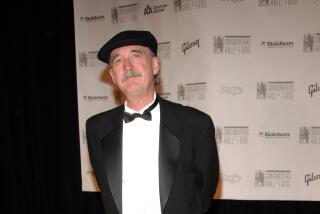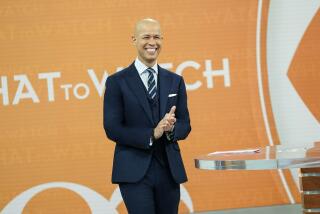A tribute to a gold standard anchor
- Share via
IT WAS ONLY FITTING that Peter Jennings was there to authenticate the most surreal moment of my life. War had suddenly broken out on a glorious autumn day in New York, and I was making my way across the stunned city to man my journalistic battle station.
As I crossed Times Square, it happened. I paused to catch the latest on the jumbo TV screen above ABC’s “Good Morning America” studio and gasped at the sight of the south tower of the World Trade Center collapsing, engulfing southern Manhattan -- where my wife and countless friends were -- in a mushroom cloud. Jennings’ own ashen on-screen look reinforced the fact that this was really happening; it wasn’t some nightmare or a scene out of a schlocky summer blockbuster.
Jennings had seen me through a lot. He became the sole anchor of ABC’s “World News Tonight” my junior year of high school. I’m not that old, but I feel old when I contemplate how the world has changed since then. Consider that his inaugural broadcast on Sept. 5, 1983, dealt with some of the fallout of the Soviet Union’s shooting down of a Korean airliner. Jennings quoted a Soviet spokesman, saying, “Our defense forces fulfilled their duty in defending the security of the motherland.”
It was only my third year living in the U.S., and in contrast with the notoriously propagandistic, rambling newscasts back in Mexico, the big three’s polished network newscasts were one of the marvels of my new home. ABC News was the gold standard in my book. The urbane and vaguely foreign duo of Jennings in the evening and Ted Koppel late at night signaled to millions of households across this reluctant global superpower that foreign news mattered most. When Tom Brokaw finally overtook Jennings in the ratings during the self-contented peace and prosperity of the Clinton era, it was as if an all-clear signal had been given.
Of course, the all-clear was premature, as evidenced by the ashen-looking Jennings on 9/11. In the intervening years, I had strayed from the habit of broadcast news, but whenever I happened to catch Jennings and his suave “We begin tonight” opening, it always offered the same comforting feeling you get from a favorite old sweater or an album you prized in high school. And Jennings wasn’t merely comforting in the days after 9/11, he was a fantastic journalist, a fact obscured by the cult of personality built around the three network anchors.
In mourning Jennings, and in previous farewells to the retiring Dan Rather and Brokaw, Americans mourned the passing of the era of mediated, shared news. Unless you are a certain age, the notion of making an appointment with an interlocutor to fill you in on the day’s events seems quaintly anachronistic.
The networks created a cult of personality around their anchors in part to stem the loss of viewers, but this only accelerated the hollowing out of their venerable news divisions. Once news came to be seen by corporate bosses as merely another profit center, choices had to be made between paying the on-air “talent” millions of dollars and retaining expensive bureaus around the world. Closing most of these down was the price of paying the likes of Koppel, Jennings and Diane Sawyer tens of millions a year. This made these journalists fabulously wealthy, but also uneasy.
Jennings, for instance, would have found it hard to replicate his success as a serious journalist at ABC nowadays. His first stint as an anchor there came when he was in his 20s. He asked to be reassigned after just two years, realizing he didn’t want to be just a pretty face reading the news. So the network sent him off to Rome, Beirut and London, and he thrived as a foreign correspondent. That would not happen today, and not just because the network no longer keeps a full-fledged correspondent in Rome. The pretense that the pretty face reading the news should understand the world is also gone.
Beyond sad in its own right, the death of Peter Jennings is also a story that reinforces and authenticates the pain inflicted by cancer upon millions. I was moved to see that the broadcast was still called “World News Tonight with Peter Jennings” on Monday, and by the reports of Jennings’ aspiration to survive the disease and return to his chair. His employer needed to believe this would happen too.
It all brought to mind the death of my own father last year. He was waging his war against leukemia while continuing to contribute mightily at work, and his employer also went to great lengths, hoping to see him pull through. But like Jennings, my father was taken while still atop his game.
There is something about the power of television and the intimacy of our relationship with the troika of anchors who presided over the last quarter of a century that makes our reflections about them turn, as in this case, autobiographical.
More to Read
The biggest entertainment stories
Get our big stories about Hollywood, film, television, music, arts, culture and more right in your inbox as soon as they publish.
You may occasionally receive promotional content from the Los Angeles Times.










